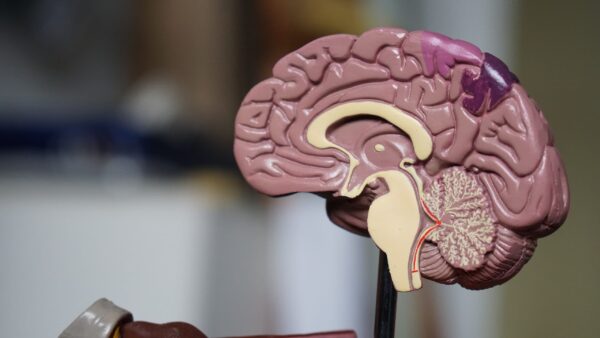
Ask an Expert: Brain Health And The Gut-Brain Axis

There is a common misconception that we only use 10 percent of our brain – when in fact, it’s more likely that we merely understand about 10 percent of how it functions. The brain, composed of billions of interconnected neurons, plays a crucial role in our cognitive processes, emotions, motor skills, and overall existence. We are not only at the forefront of unraveling its full potential but also comprehending the intricate relationships it shares with other physiological systems in our body.
In this months Ask An Expert article and after World Brain Day (July 22nd), who better to hear from than our very own Brain Health expert, Yuliya Borre, PhD?
Q: What initially motivated you to study the gut-brain axis, and how has your passion evolved throughout your career?
During my PhD studies at Utrecht University, I noticed a lot of GI and immune comorbidities in patients with Alzheimer’s disease and mood disorders. During this time, I realized that there are many factors that could play a role in brain health. I participated in various multidisciplinary collaborations looking at relationships between brain and gut disorders, trying to understand the dynamic communication between the gut microbiota and the brain – first in animal models, and later translating it into humans.
My original interest was driven by scientific curiosity, which later evolved into how we can translate these findings into the human solutions; how can we help everyday consumers leverage our scientific advances into the gut-brain axis to help them sleep better, experience less stress and anxiety and have improved optimal cognitive function?
Q: As an expert in brain health, what developments are currently exciting you the most?
There are several innovations within this rapidly evolving field that truly excite me. Personalised nutrition is one of them; it recognizes that individual differences in genetics, metabolism, microbiota composition and lifestyle can all influence brain health and how we, as individuals, respond to disease, stress, and life in general. Tailoring nutrition to the individual’s specific needs and their blueprint offers optimized brain health function and the possibility of reducing cognitive decline.
And of course, my old-time passion is the microbiome gut-brain axis. Understanding this relationship and its mode of action can offer new opportunities for developing innovative approaches to enhancing brain function and overall performance.
Q: How do you think this will impact our approach to improving neurological performance?
It represents a paradigm of precision intervention and individualized approaches and acknowledges that what works for one person may not work for another. Moving forward, personalized microbiome sampling for diagnosis and treatment holds the potential for tailoring interventions to individuals based on their unique gut microbiota, advancing the field of personalised nutrition in brain health.
We used to compartmentalize the body, focusing only on the particular body part, but with more advanced research, we realize that a more integrative approach is needed – everything is connected, especially when it comes to mental health. We know that our microbiome influences our everyday behaviour; for example, it has been shown that people who have a healthy dietary fiber intake have a better cognitive response in certain tasks[i].
Another study demonstrated that just one month of following a diet consisting of dietary fiber combined with fermented foods – a somewhat a ‘psychobiotic diet’ -resulted in an improved response to stress, feeling of well-being and better sleep quality[ii].
Q: The focus for this year’s World Brain Day is Brain Health and Disability: Leave No One Behind. What do you think can be done to help reduce the gap in equity for individuals with neurological disabilities?
It’s important to talk about the fact there is a gap between resources available and resources necessary for those in need. Reducing the gap can help us to create a more inclusive and equitable world but requires efforts from various stakeholders, from governments and organisations to individuals. As they say, it takes a village.
To name a few actions we can tangibly take today: raise awareness and reduce stigma, invest in more inclusive research and innovation, and implement inclusive education and employment practices.
About Yuliya Borre
Yuliya Borre, PhD, is the Global Senior Marketing Manager for the Biotis® Brain Health category. Yuliya is a multidisciplinary and business-savvy scientist, she has extensive experience in pre-/clinical and scientific aspects of therapeutics product development lifecycle, across food, natural plant-based ingredients, health and pharma arenas – from idea generation, R&D and clinical trial, regulatory & communication strategy, stakeholder and consumer engagement through to pre-launch and global launch activities. Yuliya is driven by making an impact on human health in a sustainable manner, and her passion for merging science and marketing continues to drive transformative advancements in the Brain Health category.
i Berding, K., Long-Smith, C.M., Carbia, C. et al. A specific dietary fibre supplementation improves cognitive performance—an exploratory randomised, placebo-controlled, crossover study. Psychopharmacology 238, 149–163 (2021)
ii Berding K, Bastiaanssen TFS, Moloney GM, Boscaini S, Strain CR, Anesi A, Long-Smith C, Mattivi F, Stanton C, Clarke G, Dinan TG, Cryan JF. Feed your microbes to deal with stress: a psychobiotic diet impacts microbial stability and perceived stress in a healthy adult population. Mol Psychiatry. 2023 Feb;28(2):601-610.